The 37th Expert Forum on Inter-Korean Relations: "Preparing for Reunification with North Korean Defectors"
The 37th Expert Forum on Inter-Korean Relations:
"Preparing for Reunification with North Korean Defectors"
- Discusses ways to improve public perception and support life-friendly resettlement
The PUAC (Executive Vice-chairperson Kim Kwan-yong) held the 37th Inter-Korean Relations Expert Forum on "Preparing for Reunification with North Korean Defectors" on February 28 at the Mozart Hall of the President Hotel in Jung-gu, Seoul.
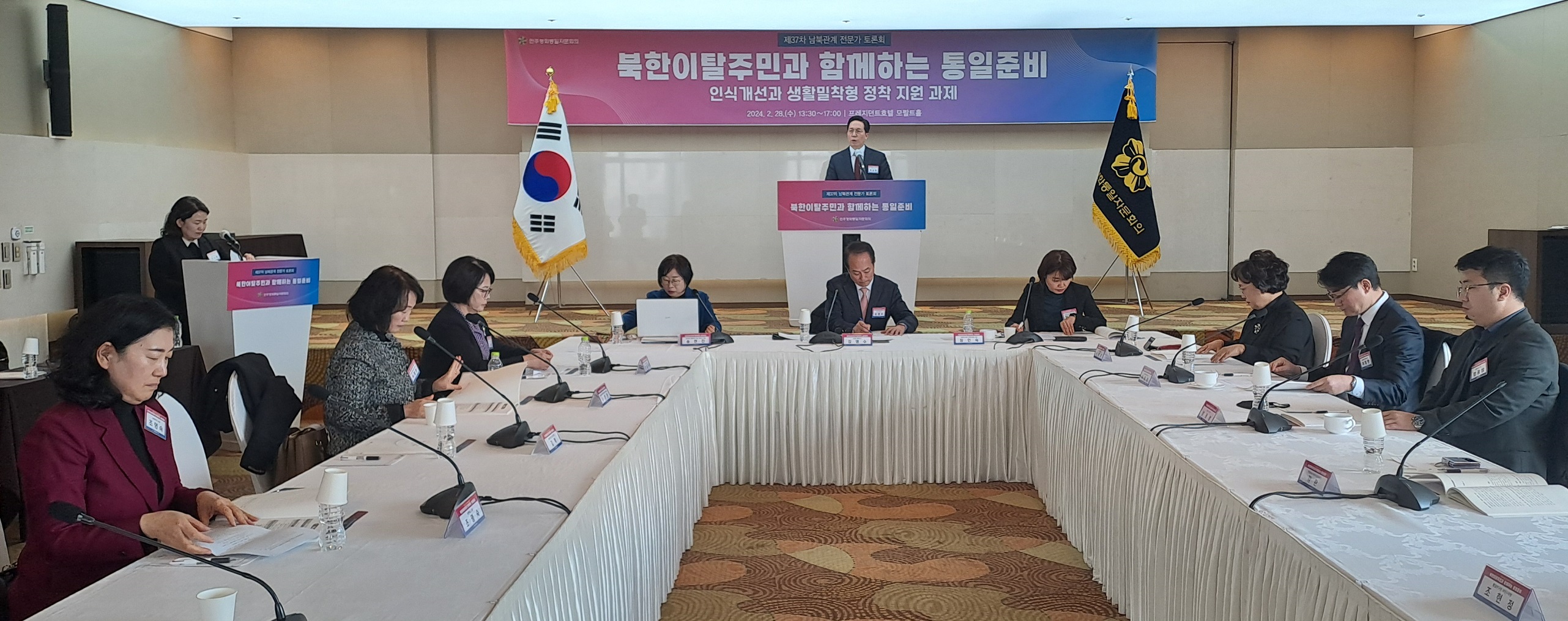
▶ View of the Expert Forum
In his opening remarks, Deputy Secretary General Dong Seung-chul said, "A public opinion poll conducted by the PUAC last year found that two out of three South Koreans believe that North Korean defectors will be helpful in the social and cultural integration and reunification of the two Koreas, and that the public and private sectors should work together for the successful settlement of North Korean defectors." "As the President, the chairperson of the PUAC, emphasized, we should do our utmost to serve as a mentor for North Korean defectors and warmly embrace them," Dong said.
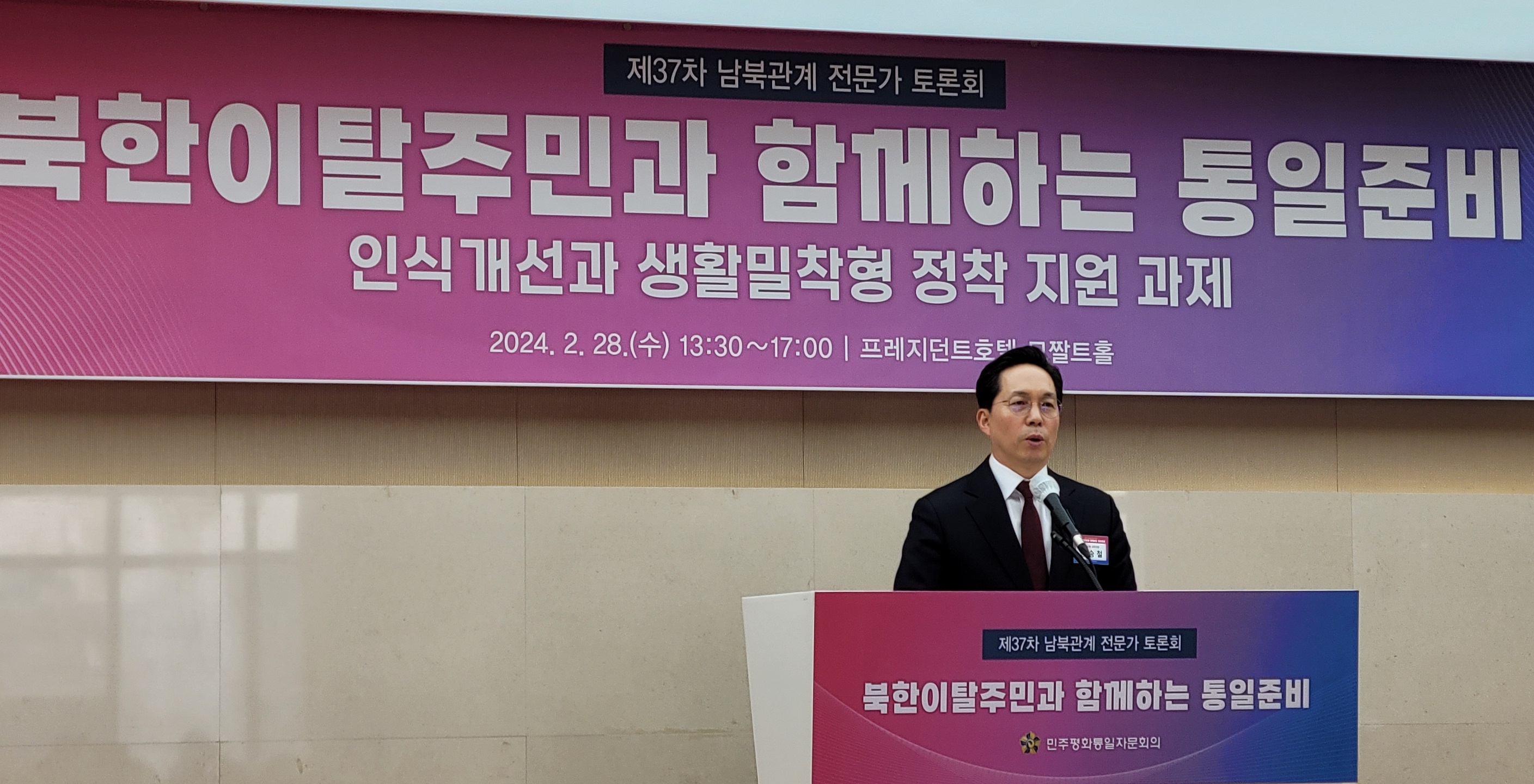
▶ Deputy Secretary General Dong Seung-chul delivering opening remarks
The panel discussion that followed the opening ceremony was moderated by Kim Young-soo, Professor Emeritus of Sogang University and Director of the North Korea Institute. Song Hyun-jin, a visiting researcher at the Institute of Unification Studies at Ewha Womans University, made the first keynote presentation on "The Perception of North Korean Defectors and Tasks for Resettlement Support.” Song said, “It can be said that the role and support of the central and local governments by age, generation, and sector are sufficient, but the problem is that there are overlapping of similar services and blind spots such as those without family or friends, and some do not even know that there is a support policy." "It is necessary for the Ministry of Unification, the Korea Hana Foundation, local governments, and the public and private sectors to assume their respective roles in establishing a system that can identify such blind spots and communicate with the defectors," Song said.
Jang In-sook, Deputy Director of the Strategic Planning Office of the Korea Hana Foundation, gave a presentation on "The Status and Challenges of North Korean Defectors: Economic Activities." Citing the analysis of the "Survey of North Korean Defectors," Jang said, "Various support is needed to help North Korean defectors gain greater economic independence and improve their quality of life, and it is necessary to find jobs that are friendly to the defectors.” "I agree with the opinion that in providing support, efficient and rational allocation of resources is necessary and that we need to look at the problems of duplication, competition, and marginalization," Jang said, adding: "It is time to think about invisible support, such as offering mentors who can be warm neighbors and accompany the defectors on their life path, rather than focusing on tangible results such as material support."
Shin Mi-nyeo, executive director of the New and One Homeland, gave a keynote presentation on “Status and Tasks of North Korean Defectors' Settlement.” "Mentors also face realistic concerns about what percentage of their lives they should devote to mentoring," Shin said, adding, “As a solution, we need to develop programs that can make mentors feel value and attract their attention."
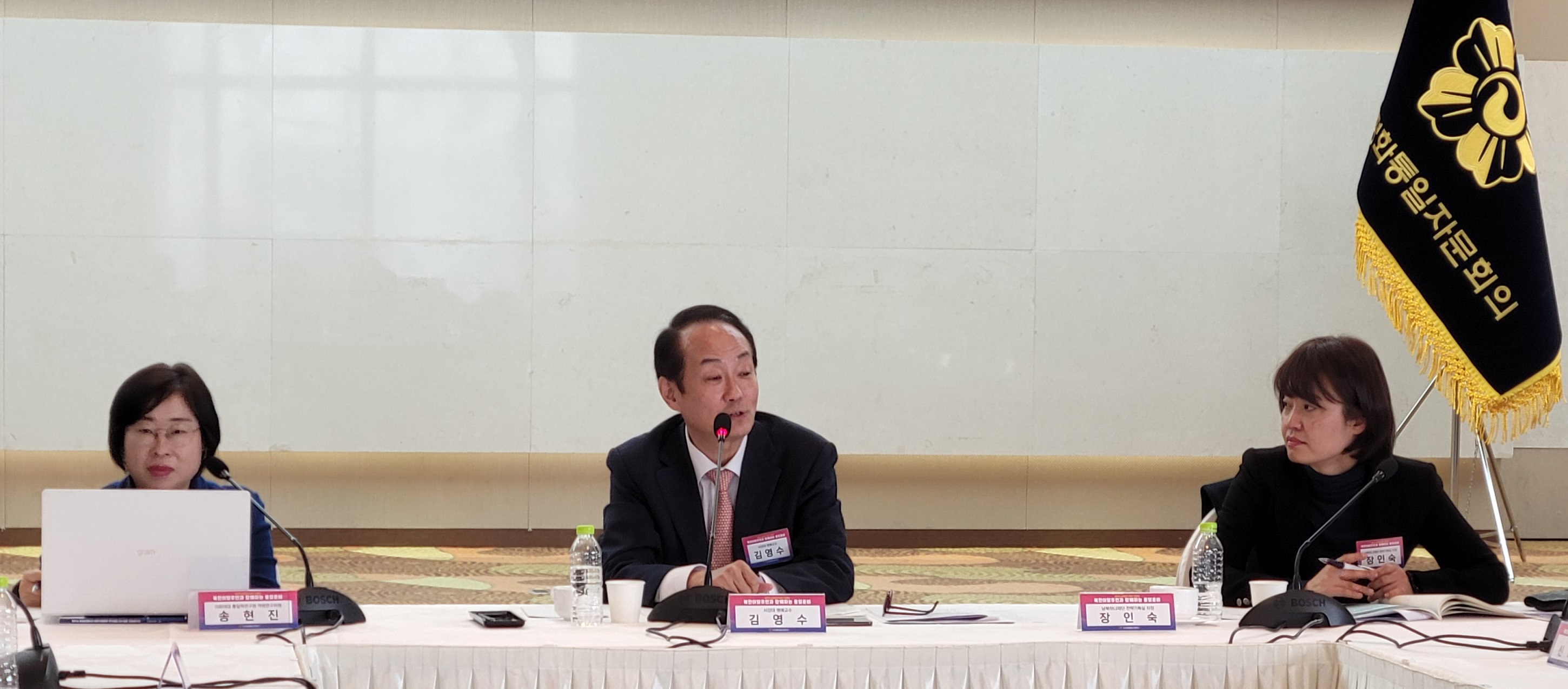
▶ Experts who served as moderator and presenters (from left: Song Hyun-jin, Visiting Research Fellow at the Institute for Unification Studies at Ewha Womans University; Kim Young-soo, Professor Emeritus at Sogang University; and Jang In-sook, Deputy Director of the Strategic Planning Office at the Korea Hana Foundation)
Cho Myung-sook, principal of Yeomyung School, said in the discussion session, "Children of North Korean defectors from China and Russia face two challenges - family problems caused by their exposure to deficiencies and shortages without a primary caregiver for a long period of time and settling in South Korean society." "The difference between support for children born in North Korea and support for children born in a third country, even if they were born to the same parent, leads to alienation within the family, so the issue of education and support for children of North Korean defectors requires more experienced and professional mentoring," Cho said.
Park Dae-hyun, CEO of Woorion, said, "The dropout rate of North Korean defector college students is more than twice as high as that of other college students, and financial literacy among North Korean defectors is the lowest among vulnerable groups." "There is a need for guidance and advice through mentoring for young North Korean defectors who are facing various problems such as falling victim to crimes," Park said. Kim Geum-ok, president of the Kim Geum-ok Culinary Institute, said, "Middle-aged and elderly North Korean defectors who are physically and mentally ill due to forced labor in the North are in desperate need of medical payment benefits outside of the official support period, and they need a mentor who they can confide in, as they are reluctant to visit specialized institutions."
Kim Hyuk, a senior researcher at the Rural Research Institute, pointed out that "North Korean defectors' interest in farming is increasing, but there is a lack of institutional and financial support systems for them." "In the face of the crisis over the extinction of rural towns and a sharp drop in the overall rural population, it is necessary to discuss linking the farming support policies with the resettlement of North Korean defectors in cooperation with local governments," Kim said. Seo Hyang-ran, head of the North Korean defector counseling center at Chungnam National University Hospital, said, "I have been working at the medical counseling center for North Korean defectors at Chungnam National University Hospital for 13 years and have helped more than 8,600 first-and second-visit patients." "As the work of helping North Korean defectors has become known, more people gave helping hands, and I feel rewarded for providing practical help to North Korean defectors who are sick in body and mind," Seo said.
Lee Young-hyun, a lawyer at the law firm Ire, pointed out that "to change the fixed legal consciousness and legal culture of North Korean defectors, continuous education is necessary after the completion of training at the Hanawon." Lee suggested that "in addition to online and offline legal education such as videos and textbooks, legal experts be matched with North Korean defectors for periodic legal mentoring." Chung Kwang-sung, a reporter for the Monthly Chosun, said, "The role of the media is important to improve public perception of North Korean defectors, but it is also important to expose them in movies and dramas as ordinary neighbors in everyday life." Finally, Cho Hyun-jung, Associate Research Fellow at the Korea Institute for National Unification, said, "Local governments' perception-improving projects have limitations because they are one-way and one-time ones, and counseling services provided by the Korea Hana Foundation and Hana Center are limited in accessibility and convenience, so it is necessary to provide one-to-one customized mentoring for North Korean defector women to help them balance work and family."
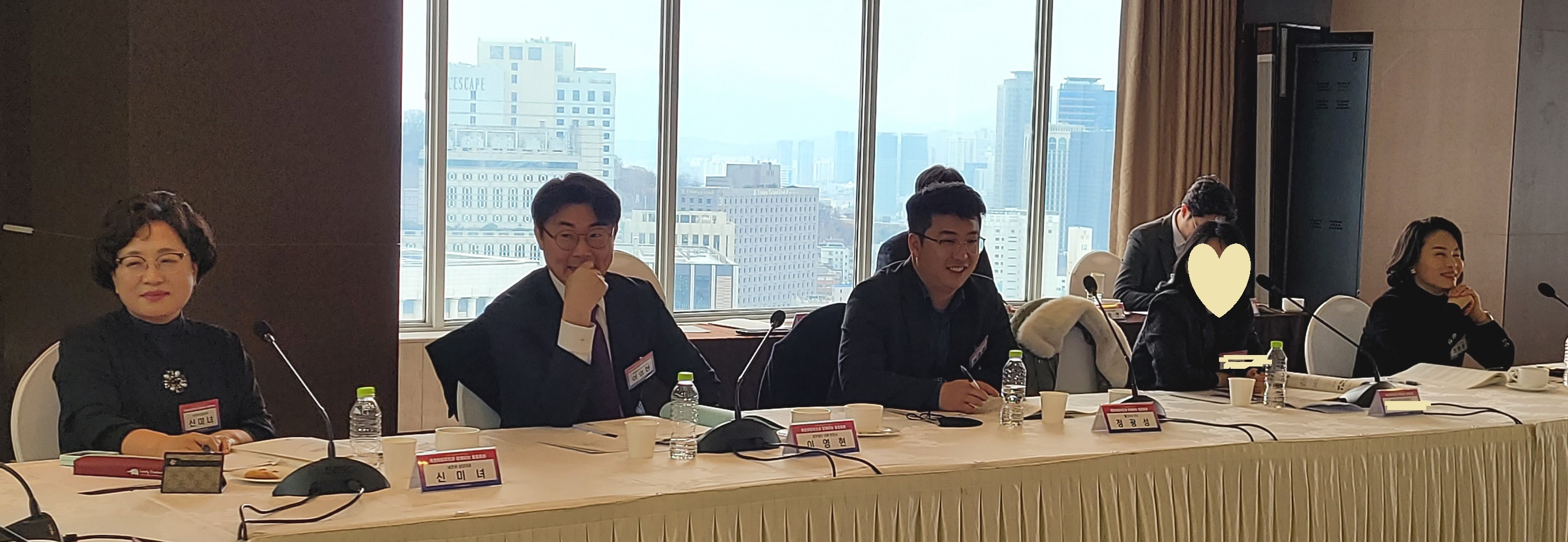
▶ Experts who presented and discussed (from left: Shin Mi-nyeo, executive director of New and One Homeland; Lee Young-hyun, attorney at the Law Firm Ire; Chung Kwang-sung, reporter at the Monthly Chosun; and Cho Hyun-jung, Associate Researcher at the Korea Institute for National Unification)
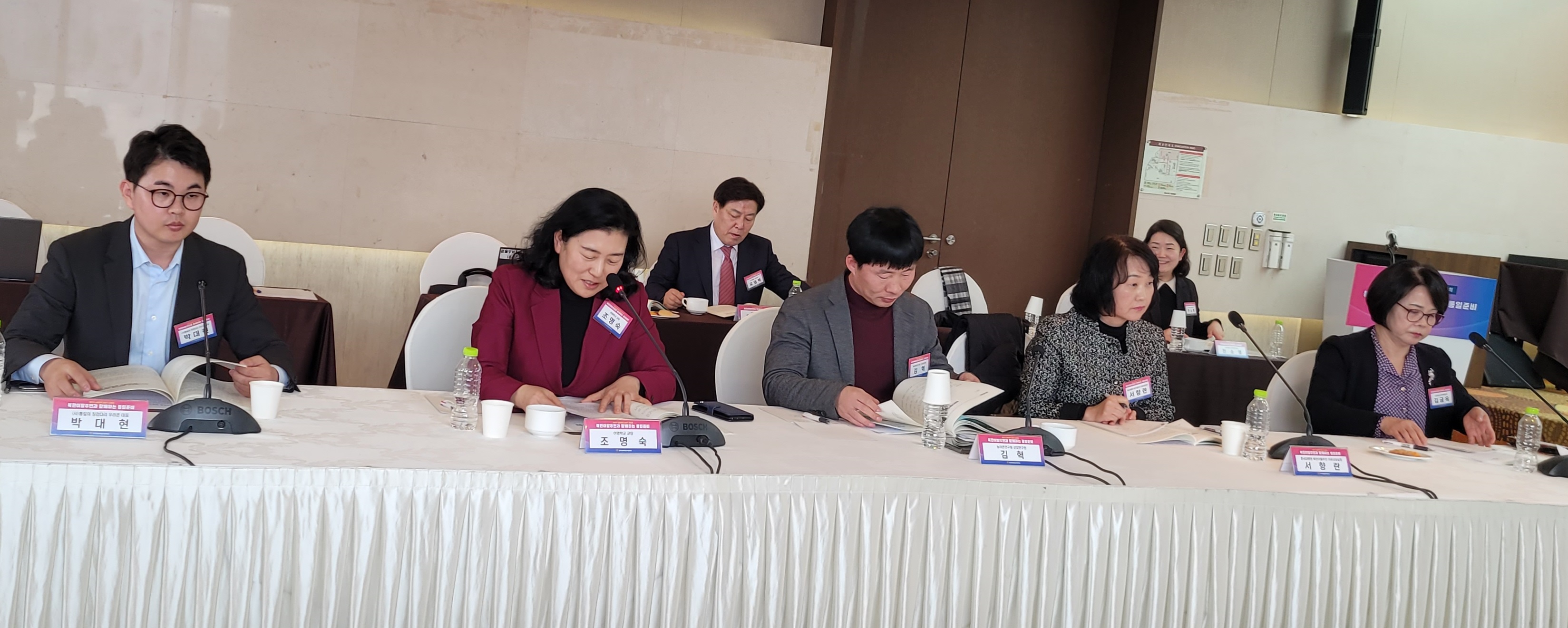
▶ Experts who participated in the discussion (From left: Park Dae-hyun, president of Woorion; Cho Myung-sook, principal of Yeomyung School; Kim Hyuk, senior researcher at the Rural Research Institute; Seo Hyang-ran, director of the North Korean defectors counseling center at Chungnam National University Hospital; and Kim Geum-ok, president of Kim Geum-ok Culinary Institute)
The experts who participated in the discussion agreed on the need for mentoring, but noted that "the mentor-mentee relationship should not be limited to simple provision of advice or education that could result in making the relationship one of subordinates and superiors and mentees feel incongruity.” They concluded that "Both mentors and mentees should strive to maintain a horizontal relationship as friends and neighbors."
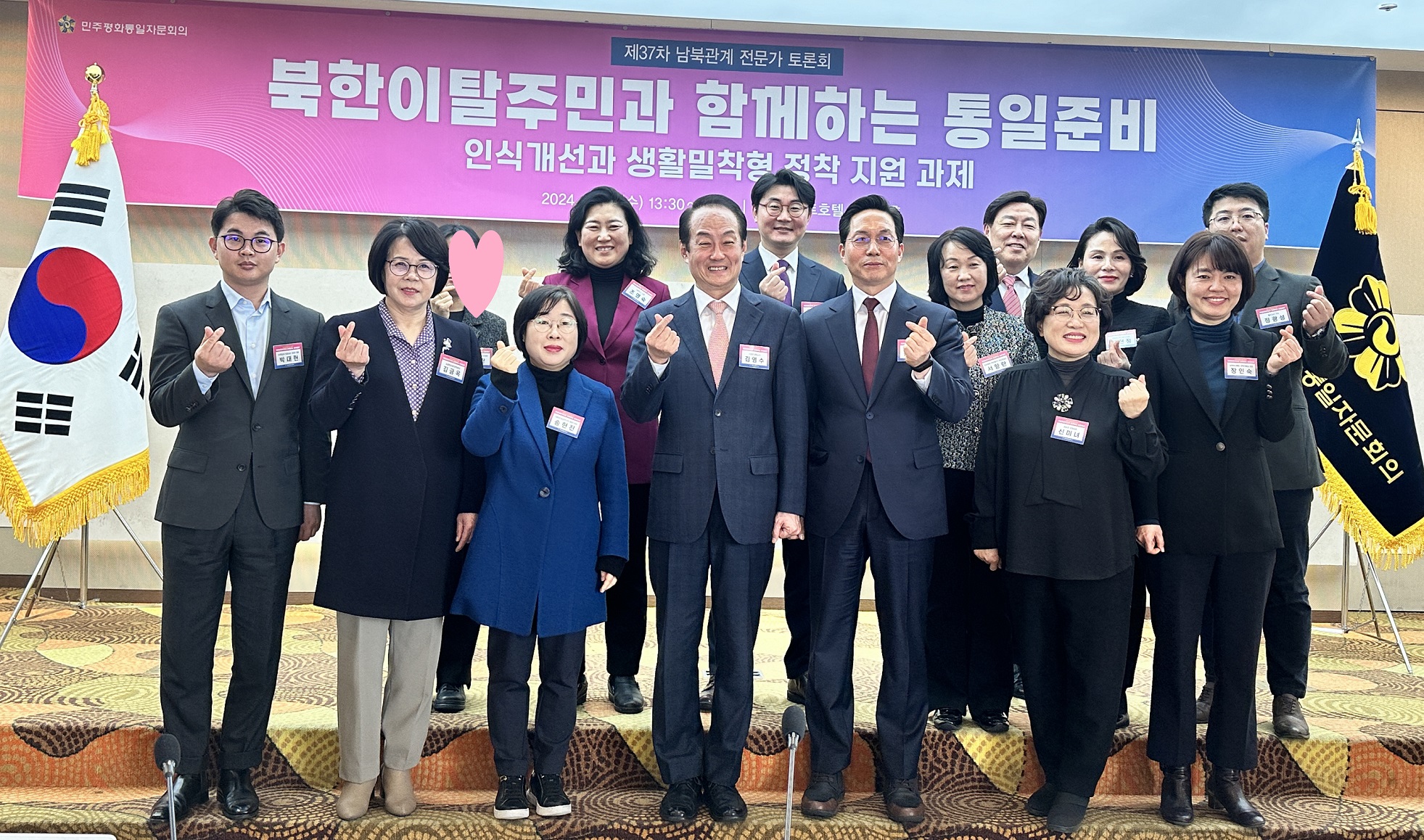
▶ A commemorative group photo of participants sending a warm message about living together with North Korean defectors













